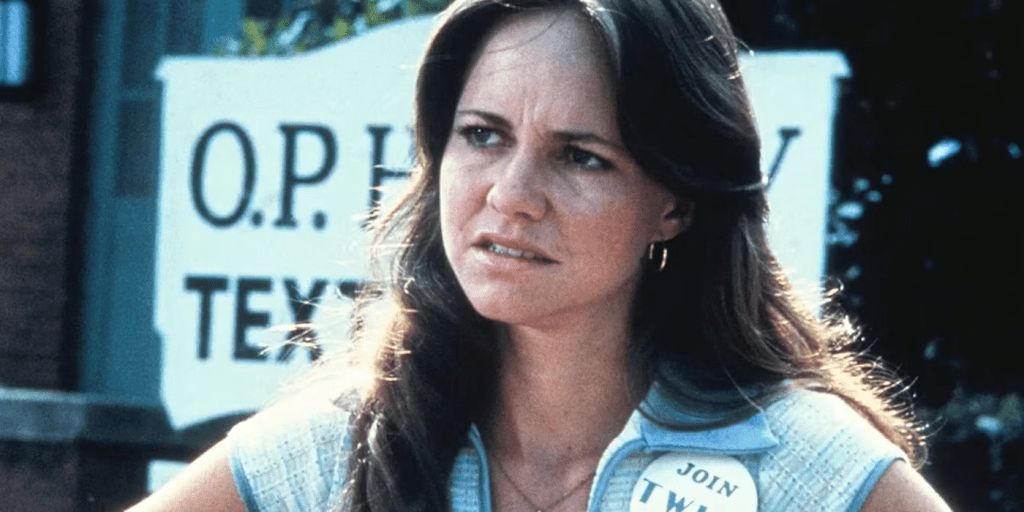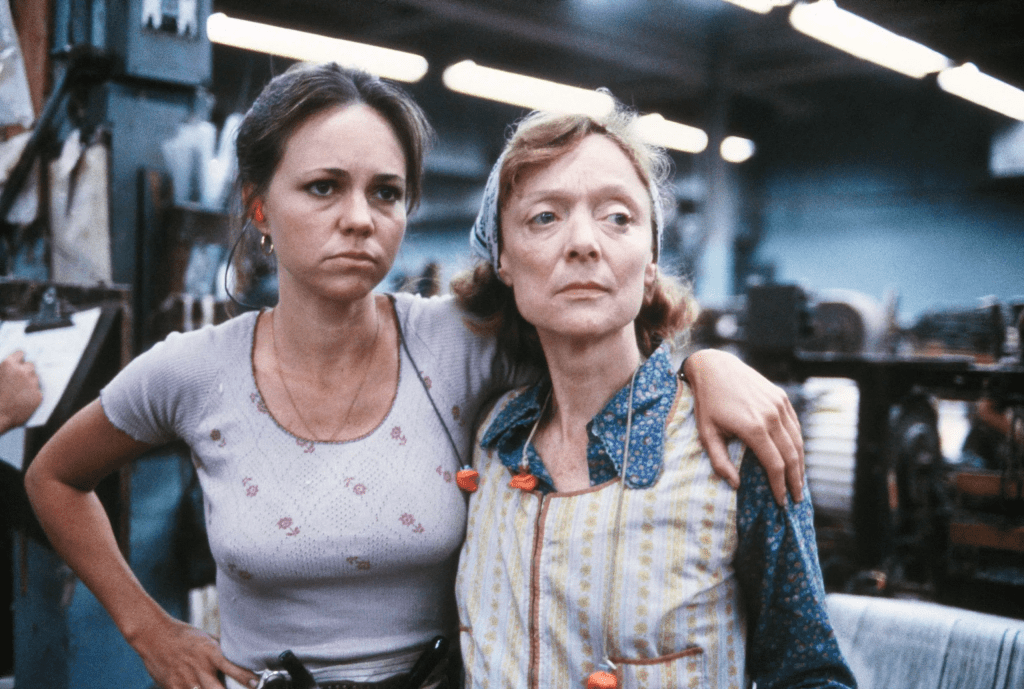Sally Field’s portrayal of Norma Rae Webster in the 1979 film Norma Rae remains one of the most celebrated performances in cinematic history. Directed by Martin Ritt, the film is a powerful exploration of the struggles of the working class, the fight for unionization, and the strength of one woman’s determination to create change. With a career-defining performance, Field brought authenticity and heart to the role, earning her widespread acclaim and an Academy Award for Best Actress.
The Story of Norma Rae: A Voice for the Voiceless

Norma Rae tells the story of a single mother working in a Southern textile mill under harsh and exploitative conditions. Norma Rae Webster’s life changes forever when she meets union organizer Reuben Warshowsky, played by Ron Leibman. Inspired by his passion for justice, she becomes a fearless advocate for unionizing her workplace, despite facing immense opposition from the factory management and her community.
The film delves into themes of resilience, social justice, and gender equality, resonating deeply with audiences across generations. Through its poignant storytelling, Norma Rae shines a light on the often-overlooked struggles of blue-collar workers and the transformative power of collective action.
Sally Field’s Transformation Into Norma Rae
To bring Norma Rae to life, Sally Field dedicated herself entirely to the role. Drawing inspiration from Crystal Lee Sutton, the real-life union organizer who inspired the film, Field immersed herself in Sutton’s world. She spent time in textile mills, spoke with union workers, and adopted a convincing Southern accent to ensure authenticity.
Field’s performance is a masterclass in emotional depth and nuance. She portrayed Norma Rae as a complex character—both vulnerable and fiercely determined. Field’s ability to convey raw emotion, whether through moments of fiery defiance or quiet introspection, made Norma Rae a relatable and inspiring figure.
The Iconic “Union” Scene: A Cinematic Masterpiece
One of the most unforgettable moments in Norma Rae is the scene where Norma stands on a table in a noisy factory, holding up a hand-drawn sign that reads “UNION.” The workers fall silent, their attention fixed on her courageous stand. This powerful image has become a symbol of resilience and the fight for justice, capturing the essence of the film’s message.
Field’s delivery in this scene is nothing short of extraordinary. Without uttering a word, she conveys determination, fear, and hope—a testament to her incredible skill as an actress. This moment not only defined the film but also cemented Sally Field’s place as one of Hollywood’s finest talents.
Cultural and Social Impact of Norma Rae
Beyond its critical and commercial success, Norma Rae had a profound cultural impact. The film highlighted the struggles of working-class Americans and the importance of unionization in improving workplace conditions. At a time when labor rights were a contentious issue, Norma Rae brought these conversations to the forefront of public consciousness.
Sally Field’s portrayal of Norma Rae inspired countless viewers, particularly women, to stand up for their rights and take on leadership roles in their communities. The film’s themes of empowerment and solidarity continue to resonate, making it as relevant today as it was over four decades ago.
Critical Acclaim and Awards

Norma Rae was a critical and commercial triumph, earning widespread praise for its storytelling, direction, and performances. The film received multiple Academy Award nominations and won two Oscars: Best Actress for Sally Field and Best Original Song for “It Goes Like It Goes.”
Field’s acceptance speech for her Oscar was heartfelt and memorable, marking a turning point in her career. Critics hailed her performance as one of the greatest in film history, praising her ability to bring depth and humanity to Norma Rae.
The film also won the prestigious Palme d’Or at the Cannes Film Festival, further solidifying its status as a cinematic masterpiece. Its accolades underscore the enduring significance of Norma Rae in the history of film and social commentary.
Sally Field’s Legacy as Norma Rae

Sally Field’s role in Norma Rae not only elevated her career but also set a new standard for female protagonists in cinema. Her portrayal of a strong, determined woman fighting for justice paved the way for more complex and empowering roles for women in film.
The film’s legacy endures as a reminder of the transformative power of storytelling. It continues to inspire filmmakers, activists, and audiences to address pressing social issues through art. Field’s performance remains a shining example of how one role can resonate across generations and leave an indelible mark on culture.
The Enduring Relevance of Norma Rae
Even decades after its release, Norma Rae holds a significant place in the cultural landscape. Its message of standing up for what’s right, no matter the odds, continues to inspire. In an era where conversations about labor rights, workplace equity, and gender equality are more crucial than ever, the film serves as a powerful reminder of the importance of courage and solidarity.
Sally Field’s performance as Norma Rae Webster is a testament to her talent, dedication, and ability to connect with audiences on a deeply emotional level. Her portrayal transformed Norma Rae into more than just a film—it became a rallying cry for justice and empowerment.

Conclusion
Sally Field’s unforgettable performance in Norma Rae is a cornerstone of cinematic history. Through her portrayal of Norma Rae Webster, Field brought authenticity and depth to a character who has become a symbol of resilience and courage. The film’s impact on culture, labor rights, and the portrayal of women in film continues to resonate, ensuring its place as a timeless classic.
As we reflect on the legacy of Norma Rae, Sally Field’s contribution stands as a shining example of the power of art to inspire change and ignite conversations that matter. Her performance remains a source of inspiration, proving that one voice can indeed make a difference.


